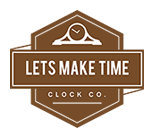How easy is it to replace a broken clock movement
Replacing a clock movement is normally fairly straightforward provided you are able measure accurately and follow instructions.
How do I know what shaft length to use?
All you need to do is measure the thickness of the material that the shaft of the clock is going to go through. We sell our clocks by the dial thickness to simplify the procedure for you. The sizes we stock are suitable for a dial thickness up to 2mm, 3mm, 6mm, 10mm, 12mm, 13mm, 16mm, 17mm & 20mm.
What is dial thickness?
Dial thickness is the measurement of the material that the shaft of the clock motor is going through. Example you have a piece of material which is 8mm thick you would simply choose a 10mm dial thickness size as the 6mm dial thickness would be to small and the 10mm is suitable for sizes up to 10mm.
Does it matter if I choose a dial thickness longer than my piece of material?
The majority of the time this does not matter and will not affect how the clock works and is often unnoticeable when hanging on a wall. If the movement has a glass/ plastic face you may need to run extra washers/ spacers at the back to get correct clearance between the face and glass/plastic.
Do I need to use a second hand?
You do not need to use a second hand; it is a personal preference on what you feel will best suit your clock. If you do not want a second hand we can include a special cap nut to cover the small hole showing hole showing when a second hand is not used.
Should I get hands?
Yes you should get new hands when you order a new clock movement, this is because there are many different hands available and no standard sizing so it is unlikely that your old hands will fit. All the hands we sell are designed for the clocks we sell and we have a huge range of hands.
My old clock has a part number on the back can I just tell you this and you will know what clock I need?
We wish this was the case but unfortunately there is no way for us to cross reference part numbers as we only deal in high quality new movements. Also there are brands from Asia that have the same part number on every clock they make. The best way is to measure the specifics of what the clock motor is going in and the size of the movement then you can choose the correct movement.
Do you fix battery-operated clocks?
Yes we can fix and replace most battery-operated clocks and replace with high quality movement and hands etc on clocks this is available in store only and is quoted before any work is carried out and the repairs are guaranteed.
Do you fix mechanical clocks?
We do not fix mechanical clocks, however we can recommend a great watch and clock maker.
I’ve seen clocks that look similar for cheaper on other stores why is this?
The simple answer to this is we only sell the highest quality clock parts available and these cost more money to buy. We have been in business for over 30 years with a large number of our customers being repeat customers who rely on us to supply them with the best quality products for their high quality work and repairs of high quality work. Clocks are a precision instrument where good quality is fundamental. When treated correctly these clocks have a life expectancy of 10-20 years.
